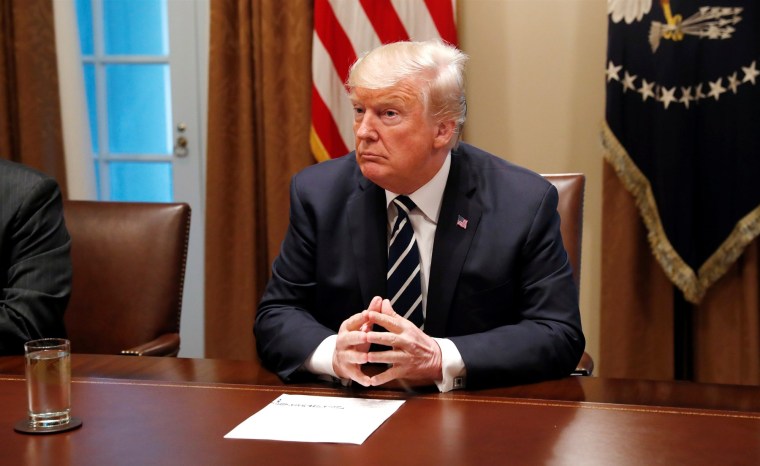Over the summer, Donald Trump told a group of supporters that he'd spoken with the head of U.S. Steel, who told him that, as a result of the president's policies, the company was opening six new plants. It wasn't long before we learned that Trump had made up the conversation, and U.S. Steel wasn't opening any new plants.
But the president was undeterred by reality. As the Toronto Star's Daniel Dale has documented in detail, Trump not only kept repeating the lie, he also inflated the number of new plants that don't exist. What started as six imaginary plants soon became seven, then eight, and more recently "at least eight."
Remember, the actual number is zero. The president nevertheless repeats the lie at nearly every campaign rally, constantly upping the ante, assuming Republican voters won't know or care about the difference.
Something eerily similar is unfolding with Trump's rhetoric about a $110 billion arms deal with Saudi Arabia, which, in reality, is not real. And yet, despite the fact that the deal does not really exist, the American president continues to ascribe new job totals to the imagined agreement.
Mar. 20, 2018: "We're talking about over 40,000 jobs in the United States."
Oct. 13, 2018: "It's 450,000 jobs."
Oct. 17, 2018: "It's 500,000 jobs."
Oct. 19, 2018: "I'd prefer that we not cancel $110 billion worth of work, which means 600,000 jobs."
Oct. 19, 2018 (a few hours later): "600,000 jobs, maybe more than that."
Oct. 19, 2018 (a few hours later after that): "So now if you're talking about -- that was $110 billion -- you know, you're talking about over a million jobs."
I half expect him to start making up gibberish numbers just to see what he can get away with. ("This arms deal will create 18 gajillion jobs....")
Of course, while it's tempting to laugh at all of this, the underlying point is quite serious.
Trump has argued repeatedly that the $110 billion arms deal is so important that the United States must be prepared to tolerate Saudi Arabian abuses, including the murder of a U.S.-based journalist. As has been well documented, this is a flawed argument from an ethical and moral perspective.
But it adds insult to injury that the Republican president's rationale is based on fraudulent job totals tied to an arms deal that is ... not ... real. This Vox piece from last week is worth revisiting:
[A]s it turns out, canceling weapons sales to Saudi Arabia won't really hurt US jobs much. There aren't that many American workers making weapons for the Pentagon, much less Saudi Arabia, and MBS isn't buying enough weapons to put a dent in the US economy anyway.Overall, the private US defense industry does directly employ a lot of US workers -- about 355,500 in 2016, according to the most the recent estimates from the Aerospace Industries Association. But private-sector defense workers make up less than 0.5 percent of the total US labor force, and that includes every person whose job depends directly on the sale or production of airplanes, tanks, bombs, and services for the entire US military. It's unlikely that many of them, if any, depend directly on weapons sales to Saudi Arabia, and it's also unlikely that those jobs would vanish if Saudi money disappeared.
Trump would have Americans believe that a Saudi Arabian arms deal, which does not actually exist, will create up to 1 million jobs in an industry that currently employees a total of 355,500 Americans.
The president has told a variety of ridiculous lies, but this one has to rank pretty high.
Postscript: When Axios asked the White House for some kind of explanation, there was no response.
